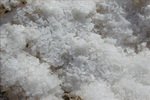|
Iodine – Essential To Thyroid Hormone ProductionIodine is a chemical element with symbol I and atomic number 53, and is also a gas which becomes an essential nutrient when dissolved in water, and is also considered a trace mineral. The primary role of the mineral is to participate in the production of thyroid hormone which is essential in energy production from fat, control cholesterol levels and participate in weight control. Iodine also appears to provide protection against breast and uterine cancer.
The hormones produced are triiodothyronine (T3) and thyroxin (T4), which also controls body temperature, basal metabolic rate, reproduction, and growth in the formation of nerves and bone, and maintenance of the skin, nails, hair, and teeth. Dietary Recommendations The thyroid gland needs about 60 micrograms/day to offset losses of the minerals and to prevent deficiency and due to the efficient absorption of the mineral an intake of 75 micrograms is considered sufficient for adults, but the recommended dietary allowance (RDA) is 150 micrograms/day for men and women. Mineral Sources The best source of the mineral is seafood, since the ocean is the best source of the mineral. Iodized salt is a primary source of the mineral for many people. Cattle feed has the mineral added to it, which results in a substantial amount in milk and dairy products. Natural amounts of the mineral in plants are a reflection of the levels in soil that the plants are growing in. 

Mineral Deficiency Goiter of the thyroid gland is an indication of iodine deficiency, which prevents the synthesis of thyroid hormones.
If the deficiency is severe during pregnancy then cretinism results, resulting in a child with stunted growth, deafness, muteness, and mental retardation. These deficiencies are generally common in developing countries. In those not in the womb prolonged deficiency can cause obesity, constipation, weakness, mental slowness, and eventually insanity. Mineral Toxicity Just as too little of the mineral can cause goiter, too much of the mineral can cause a goiter and either hypothyroidism, which is decreased functioning of the thyroid gland or hyperthyroidism which is an over functioning the thyroid gland that can lead to rapid weight loss and heart arrhythmias.
For other information on nutrition some great references are: • Nutrition – Fourth Edition by Paul Insel, Don Ross, Kimberley McMahon, and Melissa Bernstein • The Vitamin Alphabet – Your guide to vitamins, minerals and food supplements by Dr. Christiana Scott-Moncrieff MB, CHB, MFHOM
Nutrients In Food
|






